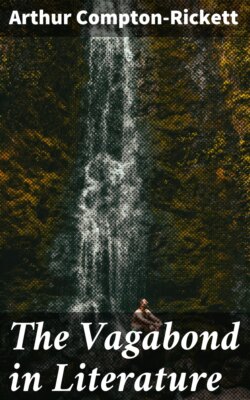Читать книгу The Vagabond in Literature - Arthur Compton-Rickett - Страница 3
На сайте Литреса книга снята с продажи.
FOREWORD
ОглавлениеTable of Contents
In the introductory paper to this volume an attempt is made to justify the epithet “Vagabond” as applied to writers of a certain temperament. This much may be said here: the term Vagabond is used in no derogatory sense. Etymologically it signifies a wanderer; and such is the meaning attached to the term in the following pages. Differing frequently in character and in intellectual power, a basic similarity of temperament gives the various writers discussed a remarkable spiritual affinity. For in each one the wandering instinct is strong. Sometimes it may take a physical, sometimes an intellectual expression—sometimes both. But always it shows itself, and always it is opposed to the routine and conventions of ordinary life.
These papers are primarily studies in temperament; and the literary aspects have been subordinated to the personal element. In fact, they are studies of certain forces in modern literature, viewed from a special standpoint. And the standpoint adopted may, it is hoped, prove suggestive, though it does not pretend to be exhaustive.
If the papers on Hazlitt and De Quincey are more fragmentary than the others, it is because these writers have been already discussed by the author in a previous volume. It has been thought unnecessary to repeat the points raised there, and these studies may be regarded therefore as at once supplementary and complementary.
My cordial thanks are due to Mr. Theodore Watts-Dunton, who has taken so kindly and friendly an interest in this little volume. He was good enough to read the proofs, and to express his appreciation, especially of the Borrow and Thoreau articles, in most generous terms. I had hoped, indeed, that he would have honoured these slight studies by a prefatory note, and he had expressed a wish to do so. Unhappily, prior claims upon his time prevented this. The book deals largely, it will be seen, with those “Children of the Open Air” about whom the eloquent author of Aylwin so often has written. I am especially glad, therefore, to quote (with Mr. Watts-Dunton’s permission) his fine sonnet, where the “Vagabond” spirit in its happiest manifestation is expressed.
“A TALK ON WATERLOO BRIDGE
“the last sight of george borrow
“We talked of ‘Children of the Open Air,’
Who once on hill and valley lived aloof,
Loving the sun, the wind, the sweet reproof
Of storms, and all that makes the fair earth fair,
Till, on a day, across the mystic bar
Of moonrise, came the ‘Children of the Roof,’
Who find no balm ’neath evening’s rosiest woof,
Nor dews of peace beneath the Morning Star.
We looked o’er London, where men wither and choke,
Roofed in, poor souls, renouncing stars and skies,
And lore of woods and wild wind prophecies,
Yea, every voice that to their fathers spoke:
And sweet it seemed to die ere bricks and smoke
Leave never a meadow outside Paradise.” [0]
A. R.
London, October, 1906
